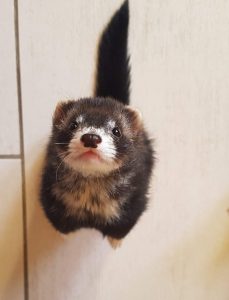If you own a ferret, then you know just how talkative they can be.
From barking to hissing, ferrets have a large range of vocalization, many of which have been outlined in a study conducted at Idaho State University.
Each noise that your ferret makes is unique, and while some, like the hiss, have a clear meaning, others, such as chattering, may leave you wondering what exactly your ferret is trying to say to you.
How do Ferrets Communicate to Each Other?
Before learning about what each noise means, it’s important to understand why a ferret uses them and how they understand noises from other ferrets.
According to a study written by a group of researchers from the University of Oxford, ferrets must “perceive a number of attributes of complex sounds, including loudness, timbre, and pitch” in order to understand a vocal call.
This means that, like humans, ferrets take in account how a sound is made rather than just the sound itself.
As discussed further below, many noises made by a ferret are nearly identical except for differences in pitch and duration.
Common Noises Made by a Ferret
Dooking

Dooking is one of the most common noises that you’ll hear your ferret making. Many people compare it to the clucking or chortling of a chicken, meaning that it’s hard to miss when your ferret is dooking.
This is a positive sound that ferrets make when they are content or excited. You’ll often hear them dooking when a new smell is introduced or when they are playing and exploring.
However, just because your ferret doesn’t dook, don’t assume that they are unhappy. Vocalization varies from ferret to ferret, and some, like humans, are just naturally quieter and more reserved than others.
Barking
Barking is a fairly rare sound from ferrets, and, like many other sounds, it have multiple meanings.
This means that you will need to pay close attention to your ferret’s behavior, their body language, and the situation they are in when deciding whether or not their barking is a positive or negative sound.
Oftentimes, barking is used as an indication of excitement, such as during playtime or exploring.
If this is the case, then you do not need to worry about intervening and separating your ferret.
However, if they are demonstrating signs of distress while barking, you may need to step in and make sure he or she is okay.
Hisses
It comes as no surprise that, when your ferret hisses, he or she is extremely unhappy.
In the study conducted at Idaho State University that was mentioned above, the ferrets, which were caught in the wild and raised in the laboratory, hissed both when approach and before and during other sounds that they made.
Like with other animals such as snakes and cats, hissing in ferrets is a major indicator that they are either angry or afraid.
However, on the rare occasion, ferrets will hiss when playfully fighting with their cage mates.
This is why it is important to fully observe the situation and other factors such as your ferret’s body language while hissing to know when to react and how exactly you should react.
Hissing is easy to recognize. It’s one of the most high pitched sounds that your ferret will make, averaging at 2.2 kHz, and is definitely an attention-grabbing warning call.
Squeaking
Squeaking is a sound of excitement and warning in ferrets. You’ll often hear this sound when your ferret is physically interacting with another ferret.
An occasional squeak is common and nothing to worry about, but, if you hear that your ferret is squeaking often and the sound is mixed with body language that indicates negativity, then you may want to step in and intervene by separating your ferrets and allowing them to calm down before interacting again.
Squealing
Think about when a human baby squeals. Most of the time it’s because they want attention or are excited and want to play, right? It’s the same with ferrets.
When they start squealing, it usually means that they are excited and playful and want attention – whether the attention comes from your or the other ferrets and animals that they have around them.
You may also even find that your ferret is squealing while he or she is sleeping. Like humans, ferrets dream, and squealing is like their version of sleep talking while dreaming.
Sneezing

Ferrets are pretty close to the floor. You know what else is on the floor? Dust. Debris. Dirt. Pretty much all sorts of things that your ferret may accidentally inhale while playing.
Ferrets also have a very strong nose and are attracted to scents, so they have a tendency to sniff nearly everything they come across at least twice.
This means that sneezing is nothing to worry about, and it’s just their way of clearing their nose and airways should they accidentally inhale some dust while playing or exploring.
However, if chronic sneezing along with other symptoms of illnesses such as a runny nose and discharge from the nose, mouth, or eyes, are present, then it is a good idea to take your little furball to the vet.
In this case, there is a very high possibility that your ferret has caught a cold and will need medical attention in order to properly heal.
Coughing
Coughing is a little bit different than sneezing, and that’s because it is the indication of some sort of illness in your ferret.
A ferret will only cough when they have a cold or respiratory infection. Or it could be an indication of allergies.
Whatever you suspect the cause is, if you hear your ferret coughing, then a quick trip to the vet is the best idea.
Whimpering
Whimpering is another one of those sounds that has an obvious meaning when you look at the same sound in other animals.
Have you ever ignored your dog for a few minutes, such as while eating dinner at the table? If they’re still a young puppy, they may end up whimpering.
You’ll notice the same thing with your ferret, and, like with squealing, it’s because they want your attention. They may want to play or be petted or may need some type of care.
If you hear your ferret whimpering, don’t ignore them. Make sure their needs are met and give them a little bit of loving before continuing with what you were doing. It’ll mean a lot to them.
Whining
Whining is very similar to whimpering, but, if sounds were a spectrum of positive to negative, this sound would be more negative than whimpering.
This indicates that your ferret still wants and needs your attention, but, rather than just because they are feeling lonely, they are oftentimes injured, in pain, or sick and need attention to help make them better.
Snoring
If you ever walk by your ferret’s enclosure while they are sleeping, other than squeals, you may be surprised to hear that your ferret is snoring!
This is completely normal and nothing to worry about. Like humans, not all ferrets snore, but you may find that yours does! So, sit back, listen to how cute he or she sounds, and giggle to yourself.
Teeth Grinding
Due to the nature of this sound, it may be a little bit harder to hear than a hiss or dook. If you do manage to hear your ferret grinding his or her teeth, however, then that is usually a sign of pain.
Ferret Body Language
Understanding what your ferret is trying to communicate goes beyond vocal cues such as volume and pitch – it also involves being able to read their body language.
Take a hissing ferret, for example.
While you’ll be able to recognize the fact that your ferret is hissing, you may not be able to decide whether he or she is angry or afraid based on sound alone. Instead, you’ll need to rely on body language as well.
If your ferret’s tail has puffed up, much like a bottle brush, while they are hissing, and they are backing away from whatever they are hissing at, you can assume they are afraid.
However, if they’re hissing while taking on a more aggressive stance – fur bristled, teeth bared – then you can assume that they are angry rather than afraid.
Final Thoughts: Ferret Noises
 Each ferret is unique, and, like humans, they can make a variety of noises to express exactly what they are feeling – whether they’re excited, content, or scared.
Each ferret is unique, and, like humans, they can make a variety of noises to express exactly what they are feeling – whether they’re excited, content, or scared.
As their owner, it’s important to be able to understand these sounds, as well as the accompanying body language, in order to know what your ferret needs.
Citations:
Sean D. Farley, Philip N. Lehner, Tim Clark, Charles Trost, Vocalizations of the Siberian Ferret (Mustela eversmanni) and Comparisons with Other Mustelids, Journal of Mammalogy, Volume 68, Issue 2, 26 May 1987, Pages 413–416
Walker, K. M., Schnupp, J. W., Hart-Schnupp, S. M., King, A. J., & Bizley, J. K. (2009). Pitch discrimination by ferrets for simple and complex sounds. The Journal of the Acoustical Society of America, 126(3), 1321–1335.
